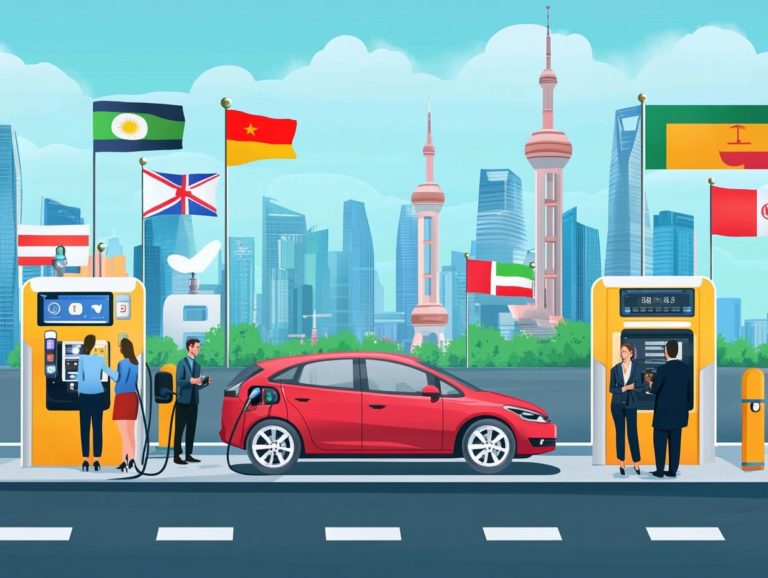electric vehicle charging technologies: what’s new?
As electric vehicles (EVs) gain momentum in the automotive landscape, understanding their charging technologies is essential for you. Let s explore a variety of charging methods, from simple plug-ins to exciting innovations like fast and wireless charging.
You ll find a discussion on the benefits these innovative technologies offer, including enhanced convenience and efficiency, while also addressing the hurdles of infrastructure and costs. It also looks at the future of EV charging technologies and their possible effects on your daily life.
Dive in to uncover what s driving the evolution of electric vehicle charging!
Contents
- Key Takeaways:
- Overview of Electric Vehicle Charging Technologies
- Recent Developments in EV Charging
- Benefits of New EV Charging Technologies
- Challenges and Limitations
- Future of EV Charging Technologies
- Frequently Asked Questions
- What are some new developments in electric vehicle charging technologies?
- What is wireless charging for electric vehicles?
- How fast can electric vehicles be charged using new technologies?
- What are smart charging capabilities for electric vehicles?
- Are there any developments in solar-powered electric vehicle charging?
- How do electric vehicle charging technologies benefit the environment?
Key Takeaways:
Advancements in fast charging are making electric vehicle charging more convenient and efficient, with some models being able to charge up to 80% in just 20 minutes.
- Wireless charging technology is a promising development in EV charging, eliminating the need for cords and making charging more seamless and user-friendly.
- The future of EV charging is bright and full of exciting possibilities, but challenges such as infrastructure and cost considerations must be addressed.
Overview of Electric Vehicle Charging Technologies
The landscape of Electric Vehicle (EV) charging technologies has undergone remarkable transformation, driven by new battery technology, smart charging solutions, and an increasingly robust network of charging infrastructure. This evolution of EV charging technology is tailored to accommodate the rising number of electric vehicles on the road today.
With an array of options at your fingertips ranging from Level 1 and Level 2 charging to DC fast charging and even wireless charging you can enjoy an enhanced charging experience that harnesses the power of renewable energy and cutting-edge technology.
This in-depth overview will explore these advancements, emphasizing their vital role in promoting sustainability and energy resilience.
Types of Charging Methods
Electric vehicle charging methods offer a range of options tailored to your lifestyle. Level 1 charging simply plugs into standard household outlets, while Level 2 charging is swifter and ideal for your daily driving habits. DC fast charging, which allows for much quicker charging than standard options, is perfect for anyone needing a quick energy boost during road trips.
Each of these methods caters to specific preferences and needs. Level 1 charging is incredibly accessible but tends to be slower, often requiring overnight sessions to achieve a full battery a less-than-ideal scenario if you’re pressed for time.
Level 2 charging is commonly found in both residential and commercial environments, providing a speedier charge, especially if you tend to cover greater distances. Plus, emerging technologies like wireless and inductive charging are making waves, promising a more seamless experience by eliminating the hassle of cables and plugs. Yet, these advancements are still in various stages of adoption and can come with challenges, such as higher costs and limited infrastructure.
Recent Developments in EV Charging
Recent developments in EV charging technologies have unveiled groundbreaking advancements that you’ll want to know about, especially in fast charging and smart charging solutions. To stay informed, check out what’s new in electric vehicle regulations. These innovations are crucial for the broader adoption of electric vehicles.
With advancements like OCPP 2.0.1 and bidirectional charging, your charging experience is becoming significantly enhanced. These technologies enable superior energy management and seamless integration with renewable energy sources, playing a vital role in achieving sustainability goals and bolstering energy resiliency.
Stay tuned for more exciting updates!
Advancements in Fast Charging
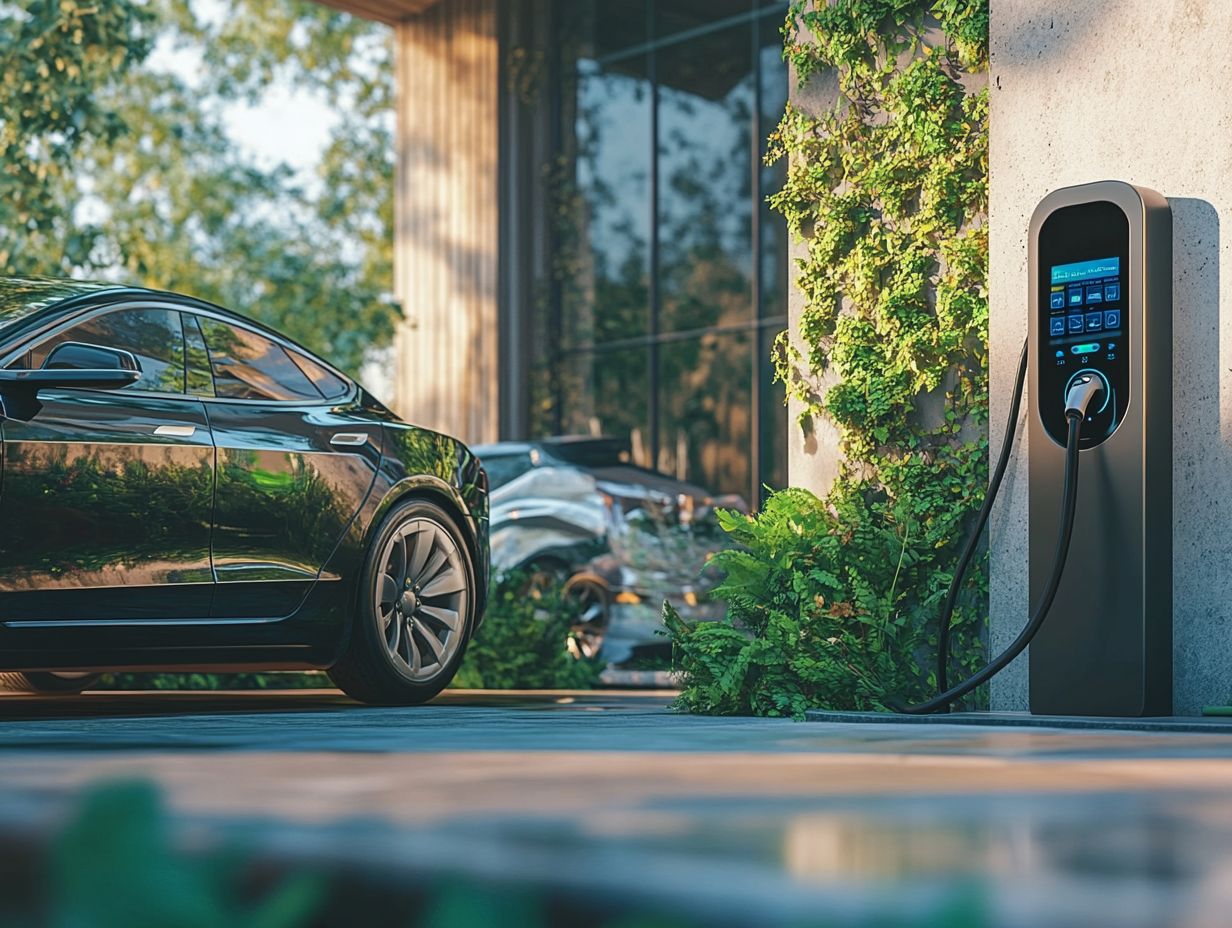
Advancements in fast charging technology, particularly with the introduction of DC fast charging stations, have transformed your charging experience as an EV driver. As we look ahead, the future of EV charging will further enhance how you can rapidly replenish your vehicle’s battery, significantly reducing downtime and making electric mobility a practical choice for your everyday life.
These stations use high-power charging to deliver a seamless and efficient process that allows you to gain substantial range in just minutes. This innovative approach not only elevates the convenience of owning an electric vehicle but also encourages more individuals to transition from traditional combustion engines.
With access to DC fast charging stations throughout urban areas and along major highways, you can embark on long journeys with greater confidence, knowing you can recharge quickly without extensive delays.
These advancements are building a robust infrastructure that supports a sustainable future, making electric vehicles an increasingly appealing option for everyone!
Wireless Charging Technology
Wireless charging technology, often referred to as inductive charging (charging without plugging in), marks a remarkable advancement in the electric mobility landscape. It allows you to charge your electric vehicle effortlessly, without the need for unnecessary physical connectors. This not only enhances your user experience but also supports sustainable energy practices.
This innovative method employs electromagnetic fields to transfer energy between two coils one placed in the ground and the other within your vehicle streamlining the process of keeping your electric car powered. By eliminating the need to plug in, you can enjoy a seamless charging experience, making the transition to electric transportation all the more enticing.
Moreover, this technology can significantly enhance the infrastructure of charging stations, optimizing space utilization and reducing the visibility of cumbersome cables. The potential for wireless charging to transform electric vehicle usage goes beyond mere convenience; it could pave the way for a wider adoption of electric cars and play a vital role in promoting environmental sustainability.
Benefits of New EV Charging Technologies
The latest advancements in EV charging hardware offer a wealth of benefits that elevate both the convenience and efficiency of charging electric vehicles. This makes them an increasingly viable choice for everyday users.
These innovations also promote sustainable energy practices and lower operational costs for charging station operators.
Improved Convenience and Efficiency
The integration of fast charging and smart charging technologies has significantly elevated your EV charging experience, offering unparalleled convenience and efficiency. Whether you’re at home or using a public charging station, you can now charge your vehicle effortlessly.
These advancements mean quicker charging times, allowing you to spend more time on the road and less time plugged into a power source. The technological upgrades in charging stations have also refined the user interface, making it easier for you to locate available chargers and monitor your charging progress through mobile apps.
Innovations like wireless charging solutions are on the horizon, further eliminating the hassle of cumbersome cables and connectors. This not only enhances your overall experience but also contributes to the expansion of charging infrastructures, paving the way for a more sustainable future for electric vehicles.
Challenges and Limitations
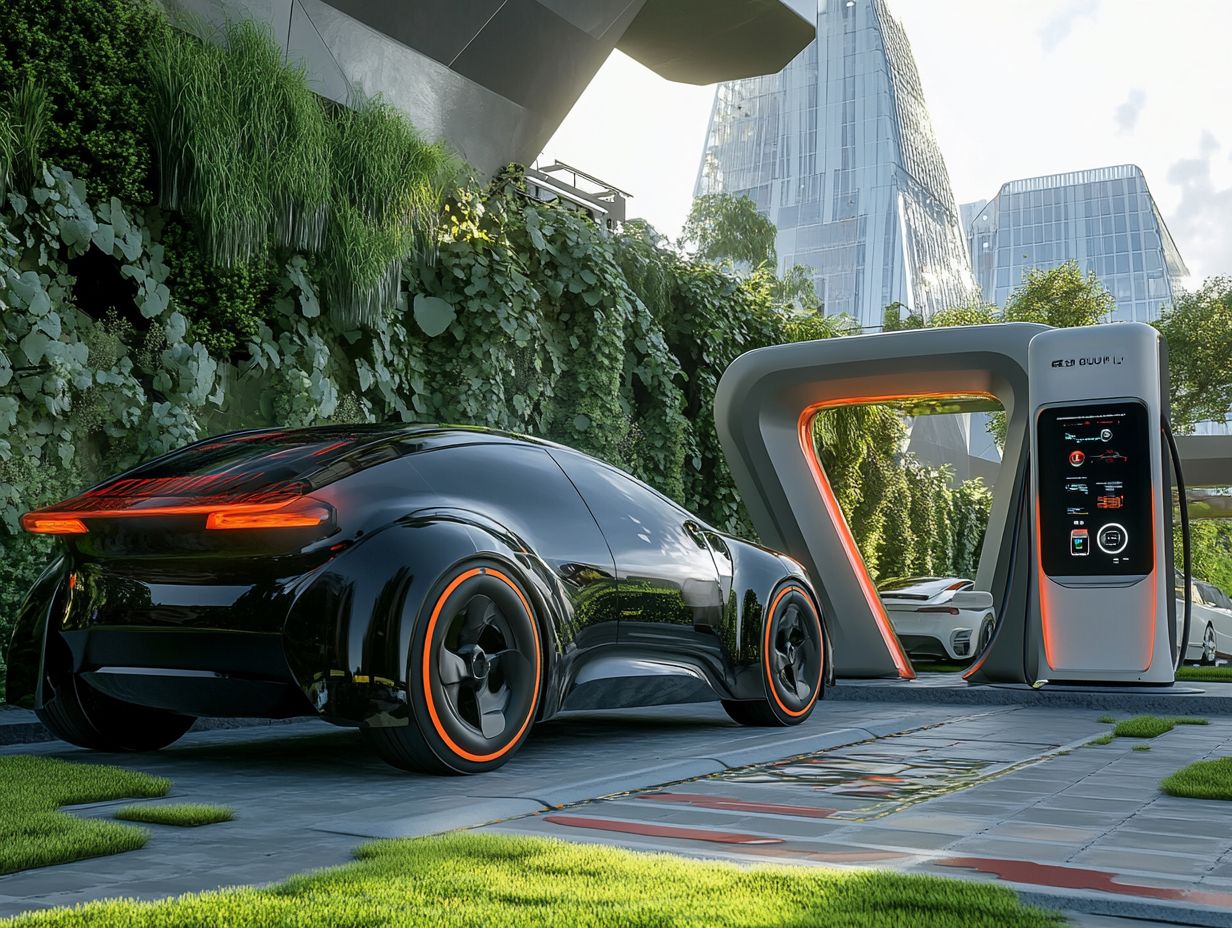
Despite the impressive advancements in EV charging technologies, you ll find that numerous challenges and limitations persist.
Key issues revolve around the development of charging infrastructure, ensuring charger compatibility, and managing the operational costs tied to the widespread deployment of these systems.
Infrastructure and Cost Considerations
Infrastructure and cost considerations play a pivotal role in the growth of the EV charging network. Installing charging stations demands a significant investment. Ongoing operational costs can greatly influence the viability of public charging solutions.
These financial hurdles can create substantial challenges for private investors and municipalities keen to encourage electric vehicle adoption among their residents. The expenses associated with site preparation and equipment procurement, along with ongoing maintenance, introduce layers of complexity to your deployment strategy.
For you, as an EV driver, the implications are clear: limited access to charging facilities could deter potential users and hinder widespread acceptance.
Fortunately, there are various solutions to help alleviate these challenges, including:
- Government incentives
- Collaborations between government and businesses
- Innovative funding mechanisms
Implementing these strategies can help distribute costs more evenly while improving coverage and service quality.
Future of EV Charging Technologies
Exciting breakthroughs in EV charging technology are just around the corner! You can expect developments such as vehicle-to-grid systems, which allow electric cars to send energy back to the grid when not in use, and cutting-edge energy storage solutions. To stay informed about the latest trends in electric vehicle technology, these advancements have the potential to revolutionize electric mobility.
They will change how you think about energy use. They will also transform energy distribution.
Predictions and Potential Impact
Predictions for the future of electric vehicle charging technologies suggest an exciting shift towards more integrated and intelligent systems. To understand what charging options are available for EVs, these advancements will leverage smart energy management and innovative charging solutions, enhancing the overall efficiency of electric vehicles in your daily life.
Imagine a charging process that runs smoothly and allows you to monitor your energy consumption patterns in real time. This means you’ll have the tools to optimize your costs effortlessly.
As smart grids evolve, you will see the incorporation of decentralized energy resources, like solar panels and wind turbines, making the transition to renewable energy sources seamless.
With the integration of artificial intelligence, your vehicle will communicate with charging stations, ensuring the most efficient energy flow tailored to demand and availability.
Ultimately, these technological innovations have the potential to transform how electric vehicles fit into your daily routine, making electric mobility more accessible and sustainable for everyone.
Frequently Asked Questions
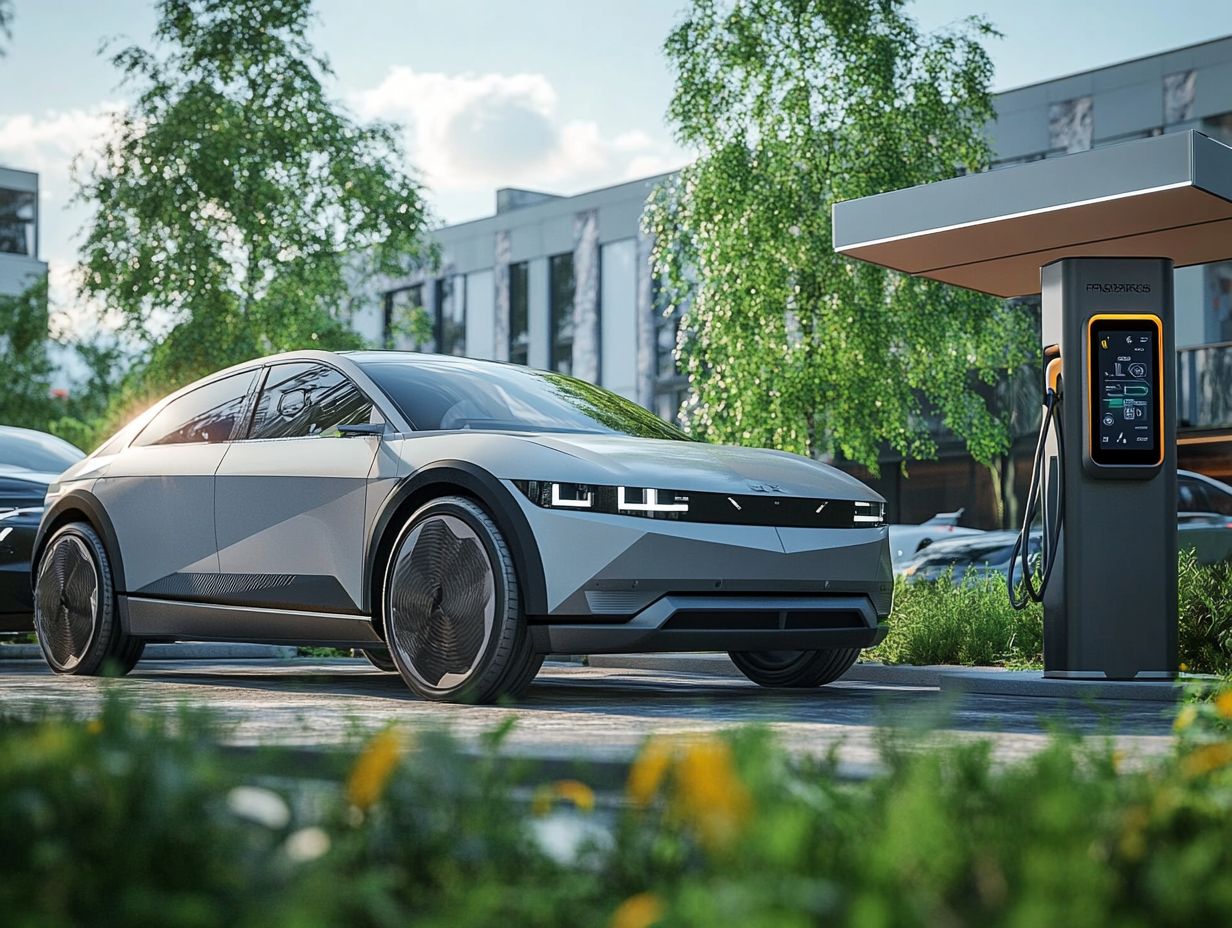
What are some new developments in electric vehicle charging technologies?
Some new developments include wireless charging, faster charging speeds, and smart charging capabilities.
What is wireless charging for electric vehicles?
Wireless charging uses electromagnetic induction to transfer energy from a charging pad on the ground to a receiver on the vehicle, eliminating the need for physical cables.
How fast can electric vehicles be charged using new technologies?
High-powered DC charging stations can charge electric vehicles in as little as 10-15 minutes, significantly reducing charging time compared to traditional methods.
What are smart charging capabilities for electric vehicles?
Smart charging allows electric vehicles to communicate with charging stations and adjust the charging rate based on energy demand, time of day, and battery level, optimizing efficiency and reducing strain on the grid.
Are there any developments in solar-powered electric vehicle charging?
Yes, advancements include using solar panels to directly charge electric vehicles, either through integrated panels on the vehicle or through solar-powered charging stations.
How do electric vehicle charging technologies benefit the environment?
Electric vehicle charging technologies reduce reliance on fossil fuels and produce lower emissions, resulting in a cleaner and more sustainable transportation system.

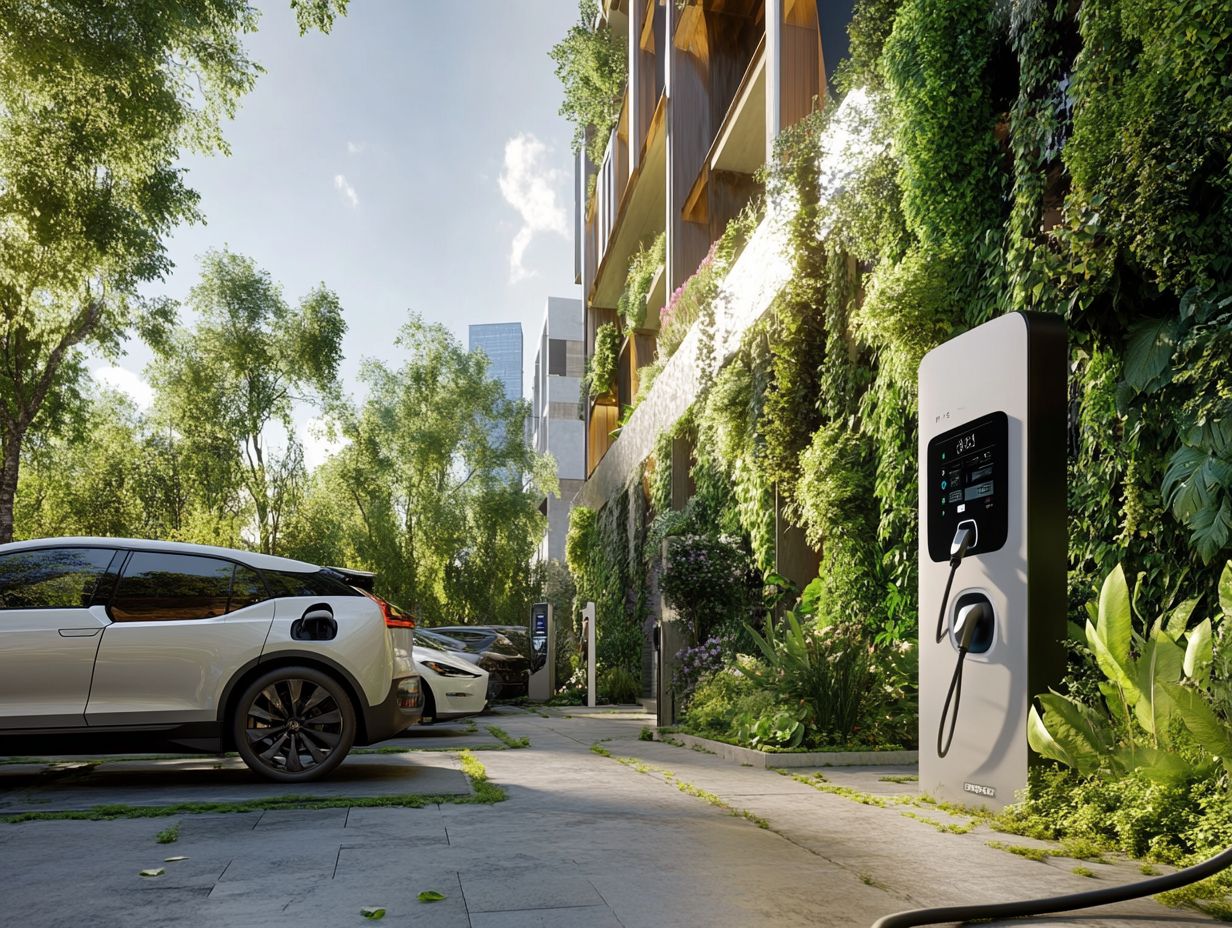 Advancements in fast charging are making electric vehicle charging more convenient and efficient, with some models being able to charge up to 80% in just 20 minutes.
Advancements in fast charging are making electric vehicle charging more convenient and efficient, with some models being able to charge up to 80% in just 20 minutes.




